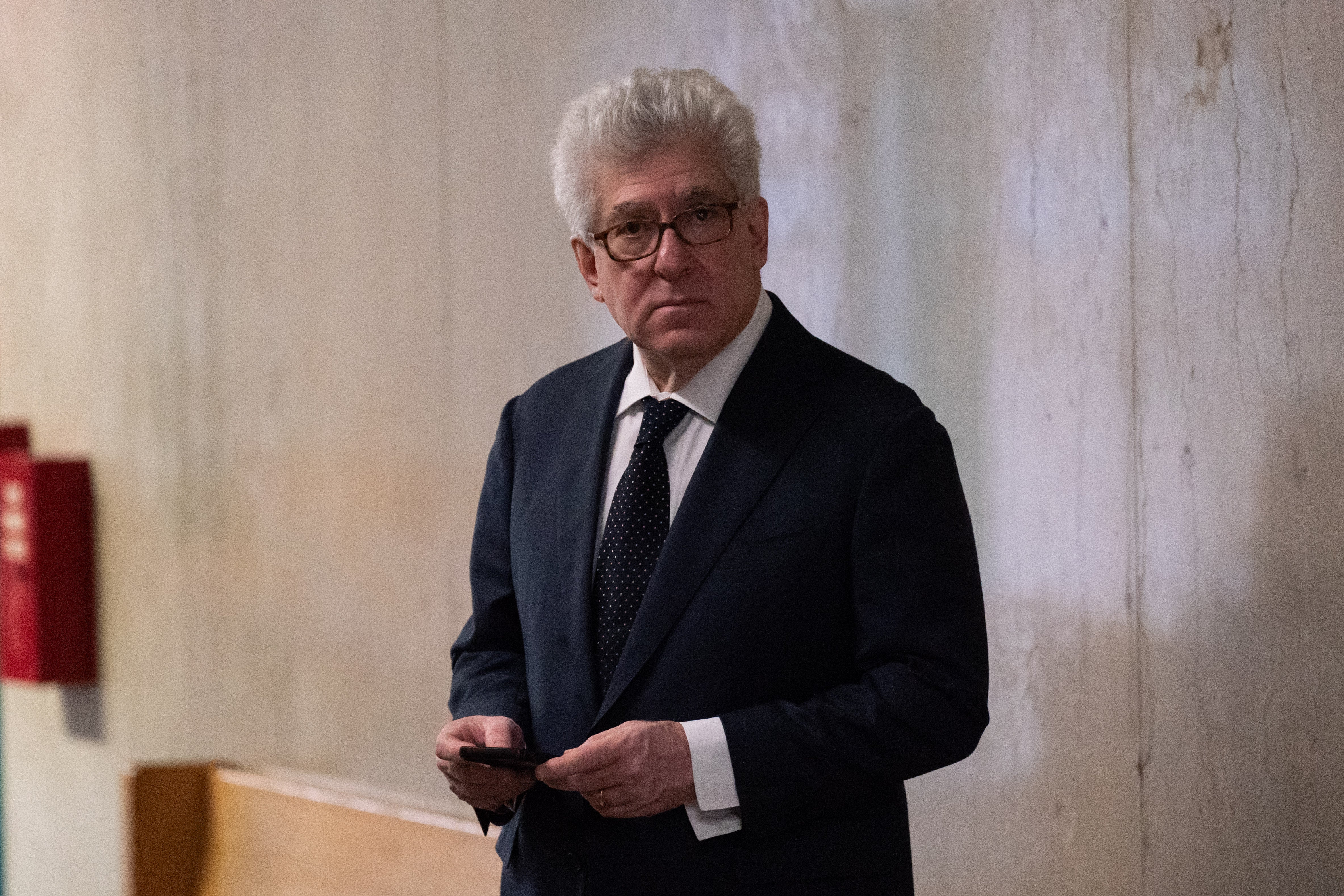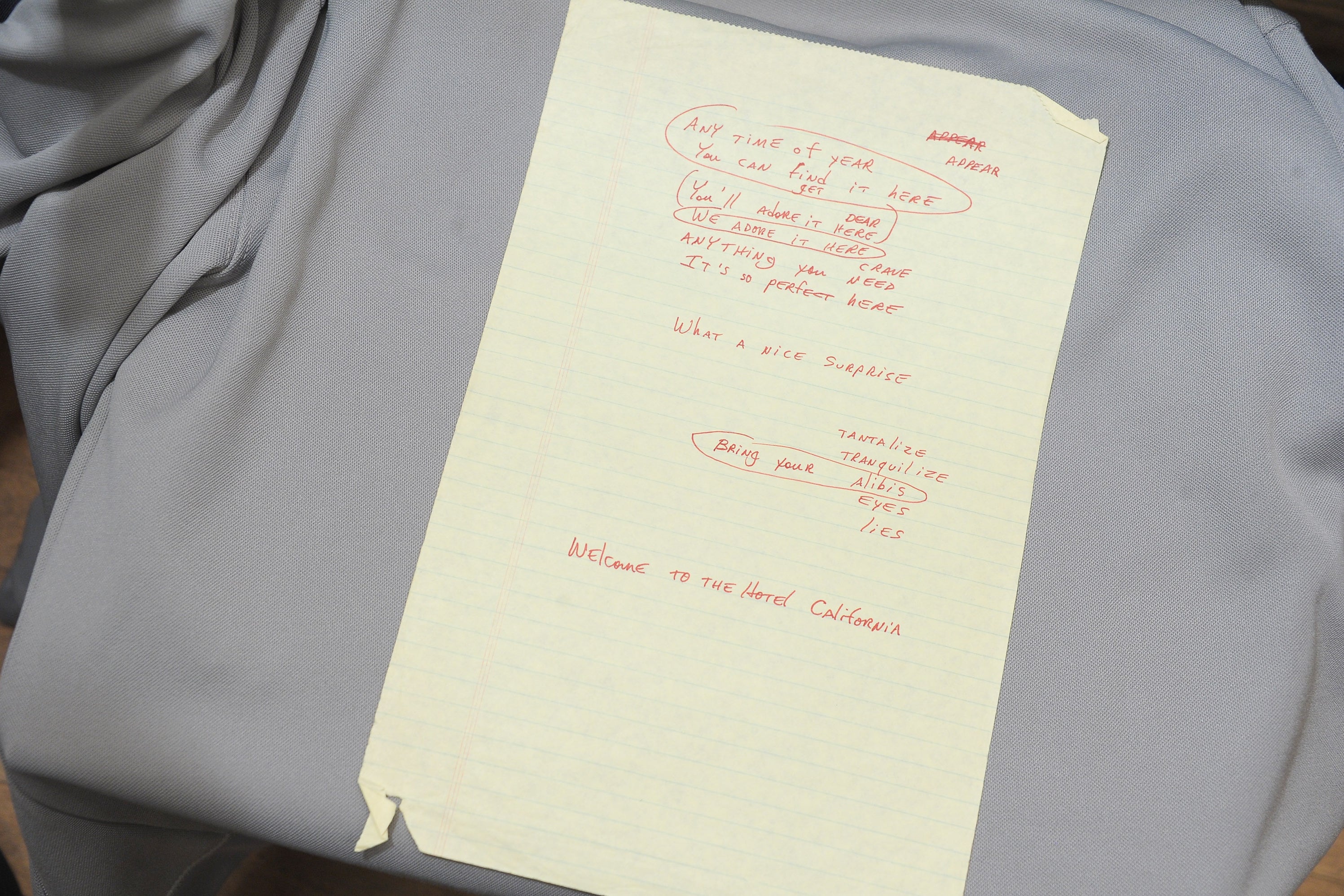
A rare-books dealer who was cleared of wrongdoing over an alleged plot to sell the handwritten lyrics to songs from the Eagles’ legendary “Hotel California” album, which singer Don Henley claimed had been stolen, contends the Rock and Roll Hall of Famer knew all along the accusations were false but pursued criminal charges against him anyway.
In a 32-page lawsuit filed Thursday evening and reviewed by The Independent, Glenn Horowitz says Henley intentionally hid the truth from cops and prosecutors and falsely portrayed the controversial New York City bookseller as a crook in order to prevent the lyric sheets from being sold. The suit also lists longtime Eagles manager Irving Azoff as a defendant. Horowitz’s suit accuses Henley of malicious prosecution, tortious interference, loss of services, and intentional infliction of emotional distress.
Henley, on the other hand, has long argued that he always considered the lyrics to be his personal property, and never intended to give them up.
In an email on Friday, attorney Caitlin Robin, who is representing Horowitz in the case, told The Independent, “Glenn is looking forward to his day in court. He already cleared his name when the charges against him were dismissed but it's time to hold those responsible who were involved in his malicious prosecution.”
Attorney Dan Petrocelli, who represents Henley and Azoff, told The Independent, “Don Henley was a witness and a victim in a criminal trial brought by the Manhattan District Attorney after a formal indictment of Glenn Horowitz by a New York grand jury. The indictment highlighted the dark underbelly of the memorabilia business that exploited the brazen, unauthorized taking and selling of Mr. Henley’s handwritten lyrics. The only malicious prosecution involved here is the filing of this case by Mr. Horowitz.”
Henley told police and the Manhattan District Attorney’s office that poet and author Ed Sanders, who the Eagles hired in 1979 to pen a never-published memoir about the band had “burglarized [Henley’s] residential estate… to obtain possession of the handwritten lyrics.”
But Horowitz — who later purchased and then resold the lyrics — contends in his complaint that Henley had in fact given them to Sanders before their working relationship fell apart five years later.

After the termination of his contract to write the Eagles book, Sanders “retained possession” of 11 notepads he received from Henley, which the rock star had filled with various notes and song lyrics during the making of “Hotel California,” the complaint states. It says there was no doubt that Sanders, who wrote the definitive book on the Manson Family and was a founder of legendary underground band The Fugs, had “acquired… the handwritten lyrics legitimately and without theft or misappropriation.”
Horowitz’s complaint says that Henley’s bogus allegation that he knew the lyrics had been “unlawfully obtained” exposed him to potential prison time, harmed his business to the tune of $10 million, and caused him and his wife Tracey “severe emotional distress.”
Testifying at Horowitz’s criminal trial, Henley emphasized that the notepads with the lyrics were his, and that in no way did he ever bequeath them to Sanders.
“I always knew those lyrics were my property,” Henley said on the stand. “I never gifted them or gave them to anybody to keep or sell.”
The first stage of the contentious dispute between Henley and Horowitz can be traced back to 2005, when Horowitz and rare bookseller John McWhinnie, a onetime Horowitz employee who later drowned in a snorkeling accident, purchased the lyric sheets from Sanders for $50,000, according to Horowitz’s complaint.
In 2006, the complaint says McWhinney and Horowitz sold the lyrics for $80,000 to songwriter Jack Feldman, who sold them back in 2011 to McWhinney and Horowitz for the same amount, in order to offset a debt he owed the pair. That same year, McWhinnie began negotiating a sale of the lyrics to former Rock & Roll Hall of Fame curator Craig Inciardi and rock memorabilia seller Ed Kosinski, who ultimately bought them for $65,000 shortly after McWhinney died in 2012, the complaint goes on.

That’s when, according to Horowitz, any connection he had to the lyrics was formally severed, “never to be reassumed.”
In March 2012, Inciardi and Kosinski put a four-page excerpt from the larger hoard of Henley lyrics up for sale in an online auction, the complaint continues. That’s when Henley’s attorney reached out to Kosinski to inquire about the possibility of Henley buying back the pages for himself, the complaint states. In laying out their provenance, Kosinski told the lawyer that had purchased the lyrics from Horowitz, who had in fact done business “amicably” with Henley previously, according to the complaint.
Horowitz worked with Inciardi, Kosinski, and Henley’s lawyer to draft a sales agreement for the four pages in April 2012, for the bargain-basement price of $8,500, the complaint states. But, it claims, Henley then filed a report with the Los Angeles Sheriff’s Department asserting that the pages “constituted stolen property and [were] unlawfully in the possession of Ed Kosinski and Craig Inciardi.”
Over the next two years, Inciardi and Kosinski continued selling off pages from Henley’s notepads, putting several on the auction block at Sotheby’s, according to the complaint. However, it says Henley continued to pursue his property, and things hit a snag in 2014 when Henley’s attorney contacted Sotheby’s to stop the sale of the original lyrics to the Eagles’ 1977 hit, “Life in the Fast Lane,” claiming them to be “either counterfeit or stolen.”
In December 2016, Inciardi and Kosinski once again approached Sotheby’s, this time to sell Henley’s original drafts of the lyrics to the title track from “Hotel California,” according to the complaint. But again, Henley’s lawyer, along with Azoff, stepped in to stop the auction, according to the complaint.
At this point, the Manhattan DA’s Office finally opened an investigation into Inciardi, Kosinski, and Horowitz, and in June 2022, all three were indicted on charges including first-degree criminal possession of stolen property, a felony carrying up to 25 years behind bars.
Horowitz and the others pleaded not guilty. Sanders was never charged with a crime.

In his complaint, Horowitz argues that Henley and his team “knew or should have known” that he “lawfully owned and possessed the handwritten lyrics as of 2005,” and that he “lawfully exercised his right” to sell them in 2012. Instead, Horowitz contends, Henley “pursued, and materially assisted” authorities in bringing criminal charges against him “by making false statements… with malicious intent,” according to the complaint.
The trial kicked off in February 2024, amid intense media coverage and testimony from Henley, who continued to reiterate his ownership of the lyrics. A month later, the charges against Horowitz, Inciardi, and Kosinski were dropped amid perjury allegations and revelations that Henley’s attorneys had allegedly withheld about 6,000 pages of evidence potentially favorable to the defense.
“These delayed disclosures revealed relevant information that the defense should have had the opportunity to explore in cross-examination of the People’s witnesses,” Assistant DA Aaron Ginandes wrote in a letter to the court.
In dismissing the case, Judge Curtis Farber knocked Henley’s side for using attorney-client privilege to keep the evidence from public view, allowing them “to obfuscate and hide information that they believed would be damaging.” (Following the truncated criminal trial, Henley sued Inciardi and Kosinski for the return of the lyric sheets. The case was settled last month, under terms that remain confidential.)
Horowitz is asking a judge to award him punitive damages, to be determined at trial, as well as attorneys’ fees.







